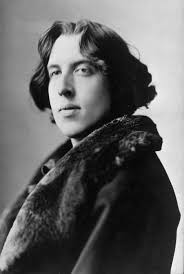The Picture of Dorian Gray Page #11
The Picture of Dorian Gray is a Gothic and philosophical novel by Oscar Wilde, first published complete in the July 1890 issue of Lippincott's Monthly Magazine. Fearing the story was indecent, prior to publication the magazine's editor deleted roughly five hundred words without Wilde's knowledge.
Suddenly he stopped and glanced up at the houses. He found that he had passed his aunt's some distance, and, smiling to himself, turned back. When he entered the somewhat sombre hall, the butler told him that they had gone in to lunch. He gave one of the footmen his hat and stick and passed into the dining-room. "Late as usual, Harry," cried his aunt, shaking her head at him. He invented a facile excuse, and having taken the vacant seat next to her, looked round to see who was there. Dorian bowed to him shyly from the end of the table, a flush of pleasure stealing into his cheek. Opposite was the Duchess of Harley, a lady of admirable good-nature and good temper, much liked by every one who knew her, and of those ample architectural proportions that in women who are not duchesses are described by contemporary historians as stoutness. Next to her sat, on her right, Sir Thomas Burdon, a Radical member of Parliament, who followed his leader in public life and in private life followed the best cooks, dining with the Tories and thinking with the Liberals, in accordance with a wise and well-known rule. The post on her left was occupied by Mr. Erskine of Treadley, an old gentleman of considerable charm and culture, who had fallen, however, into bad habits of silence, having, as he explained once to Lady Agatha, said everything that he had to say before he was thirty. His own neighbour was Mrs. Vandeleur, one of his aunt's oldest friends, a perfect saint amongst women, but so dreadfully dowdy that she reminded one of a badly bound hymn-book. Fortunately for him she had on the other side Lord Faudel, a most intelligent middle-aged mediocrity, as bald as a ministerial statement in the House of Commons, with whom she was conversing in that intensely earnest manner which is the one unpardonable error, as he remarked once himself, that all really good people fall into, and from which none of them ever quite escape. "We are talking about poor Dartmoor, Lord Henry," cried the duchess, nodding pleasantly to him across the table. "Do you think he will really marry this fascinating young person?" "I believe she has made up her mind to propose to him, Duchess." "How dreadful!" exclaimed Lady Agatha. "Really, some one should interfere." "I am told, on excellent authority, that her father keeps an American dry-goods store," said Sir Thomas Burdon, looking supercilious. "My uncle has already suggested pork-packing, Sir Thomas." "Dry-goods! What are American dry-goods?" asked the duchess, raising her large hands in wonder and accentuating the verb. "American novels," answered Lord Henry, helping himself to some quail. The duchess looked puzzled. "Don't mind him, my dear," whispered Lady Agatha. "He never means anything that he says." "When America was discovered," said the Radical member--and he began to give some wearisome facts. Like all people who try to exhaust a subject, he exhausted his listeners. The duchess sighed and exercised her privilege of interruption. "I wish to goodness it never had been discovered at all!" she exclaimed. "Really, our girls have no chance nowadays. It is most unfair." "Perhaps, after all, America never has been discovered," said Mr. Erskine; "I myself would say that it had merely been detected." "Oh! but I have seen specimens of the inhabitants," answered the duchess vaguely. "I must confess that most of them are extremely pretty. And they dress well, too. They get all their dresses in Paris. I wish I could afford to do the same." "They say that when good Americans die they go to Paris," chuckled Sir Thomas, who had a large wardrobe of Humour's cast-off clothes. "Really! And where do bad Americans go to when they die?" inquired the duchess. "They go to America," murmured Lord Henry. Sir Thomas frowned. "I am afraid that your nephew is prejudiced against that great country," he said to Lady Agatha. "I have travelled all over it in cars provided by the directors, who, in such matters, are extremely civil. I assure you that it is an education to visit it." "But must we really see Chicago in order to be educated?" asked Mr. Erskine plaintively. "I don't feel up to the journey." Sir Thomas waved his hand. "Mr. Erskine of Treadley has the world on his shelves. We practical men like to see things, not to read about them. The Americans are an extremely interesting people. They are absolutely reasonable. I think that is their distinguishing characteristic. Yes, Mr. Erskine, an absolutely reasonable people. I assure you there is no nonsense about the Americans." "How dreadful!" cried Lord Henry. "I can stand brute force, but brute reason is quite unbearable. There is something unfair about its use. It is hitting below the intellect." "I do not understand you," said Sir Thomas, growing rather red. "I do, Lord Henry," murmured Mr. Erskine, with a smile. "Paradoxes are all very well in their way...." rejoined the baronet. "Was that a paradox?" asked Mr. Erskine. "I did not think so. Perhaps it was. Well, the way of paradoxes is the way of truth. To test reality we must see it on the tight rope. When the verities become acrobats, we can judge them." "Dear me!" said Lady Agatha, "how you men argue! I am sure I never can make out what you are talking about. Oh! Harry, I am quite vexed with you. Why do you try to persuade our nice Mr. Dorian Gray to give up the East End? I assure you he would be quite invaluable. They would love his playing."
Translation
Translate and read this book in other languages:
Select another language:
- - Select -
- 简体中文 (Chinese - Simplified)
- 繁體中文 (Chinese - Traditional)
- Español (Spanish)
- Esperanto (Esperanto)
- 日本語 (Japanese)
- Português (Portuguese)
- Deutsch (German)
- العربية (Arabic)
- Français (French)
- Русский (Russian)
- ಕನ್ನಡ (Kannada)
- 한국어 (Korean)
- עברית (Hebrew)
- Gaeilge (Irish)
- Українська (Ukrainian)
- اردو (Urdu)
- Magyar (Hungarian)
- मानक हिन्दी (Hindi)
- Indonesia (Indonesian)
- Italiano (Italian)
- தமிழ் (Tamil)
- Türkçe (Turkish)
- తెలుగు (Telugu)
- ภาษาไทย (Thai)
- Tiếng Việt (Vietnamese)
- Čeština (Czech)
- Polski (Polish)
- Bahasa Indonesia (Indonesian)
- Românește (Romanian)
- Nederlands (Dutch)
- Ελληνικά (Greek)
- Latinum (Latin)
- Svenska (Swedish)
- Dansk (Danish)
- Suomi (Finnish)
- فارسی (Persian)
- ייִדיש (Yiddish)
- հայերեն (Armenian)
- Norsk (Norwegian)
- English (English)
Citation
Use the citation below to add this book to your bibliography:
Style:MLAChicagoAPA
"The Picture of Dorian Gray Books." Literature.com. STANDS4 LLC, 2025. Web. 17 Mar. 2025. <https://www.literature.com/book/the_picture_of_dorian_gray_869>.








Discuss this The Picture of Dorian Gray book with the community:
Report Comment
We're doing our best to make sure our content is useful, accurate and safe.
If by any chance you spot an inappropriate comment while navigating through our website please use this form to let us know, and we'll take care of it shortly.
Attachment
You need to be logged in to favorite.
Log In